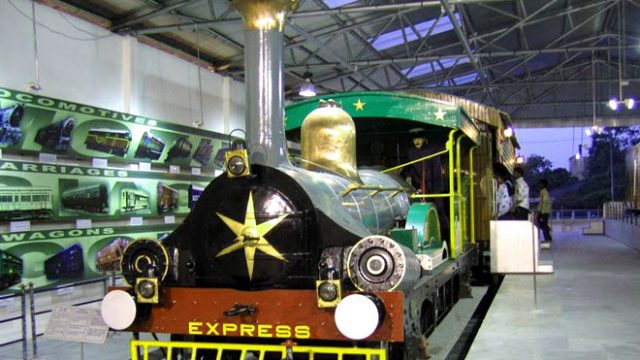It’s not the Palace on Wheels but they’re still selling the Maharaja idea. Or so it seems. There is a turbaned waiter with tea and coffee, a reception committee complete with marigold mala and tilak, and a red carpeted ante room in which to wait for the train’s departure. We are met by the Coordinator of the journey from the Ministry of Railways, an eager-beaver type. He informs me that he has received countless letters from NRIs in Boston and immigration officials in England, to say how very much they enjoyed their trip. As if on cue, the NRI computer engineer from Dallas, on the train en famille, announces that he “simply loves train journeys”. The train guard tells me how he has to push back the milling crowds of humanity that congregate at the water filling stations to see the 150 year old steam engine puffing into the platform. The build-up is complete. The stage is set for a long, leisurely – and inevitably anticlimactic – journey on the Fairy Queen.
I learn, for starters, that the Queen was never a Princely train. She began her career on the Howrah to raniganj line of the East Indian Railway in 1855. Which figures because at Gurgaon Station our imperialist engine makes an unscheduled stop for the sole firang passenger, who seems to have missed the train. He arrives, bemused and breathless, poor man, having been taken first to New Delhi Station and then the Rail Museum. Eventually we move on. Lunch is served. Sweet corn soup with cheese straws. Slight controversy about the cheese straws being picked up by hand by the serving waiter. NRI family unhappy. I gobble down my kaali dal and mixed sabzi because I want to get off at the next station and travel in front with the driver, on the engine. I stand there, two Mother Dairy mishti dois in hand, feeling awkward. Finally I persuade the driver and Assistant No.1 to take them. Assistants No. 2, 3 and 4 continue to shovel coal into the red-hot insides of the engine, and the smoke emerges, billowing past my nose to form a no-doubt picture-perfect image, as we chug steadily through the mustard fields. The feeling is exhilarating.
In the distance, a rusty tubewell emits a steady stream of water into the green genhu field. A girl in a vivid yellow odhni stands on tiptoe to reach up into a tree with a twig. Women sort freshly dug-up onions by the side of the tracks. Thelas piled high wait at level crossings, a herd of goats runs helter skelter at the shrill sound of the whistle. At every station where we stop to fill water (which must be heated by burning coal, to create steam that will then push the pistons of the engine) there is the ritual cleaning to be gone through. As Girish put it, it’s like trying to go on a long journey with a baby elephant. You have to pet it and feed it and groom it and coax it…the cajoling takes the form of six grown men, some getting underneath the engine to clean up the constantly accumulating muck, some climbing on top to polish the dark metal to gleaming glory.
The stations in Rajasthan don’t have very much water, and the Queen’s underslung water tank needs regular refilling. At one station, Khairthal, the hose pipe is dragged to a house facing the tracks…and there’s a line of people all along the route. The men are in front, the boys elbow each other out of the way, the girls stand a little apart from the crowd, curious but hesitant to push their way in.
We arrive at Alwar Station to be swept into a waiting bus. After having endured the tremendous discomfort of a non-air-conditioned train ride, we must, of course, be compensated by being shepherded into a freezing AC coach, complete with disco bhangra. Main puttar Punjab da, tu Punjab di rani(to which she says, in rolling American accent “Give me a break!”) “Is this Rajasthani music, then?” ventures the British tourist. “Quite…energetic, isn’t it?”




